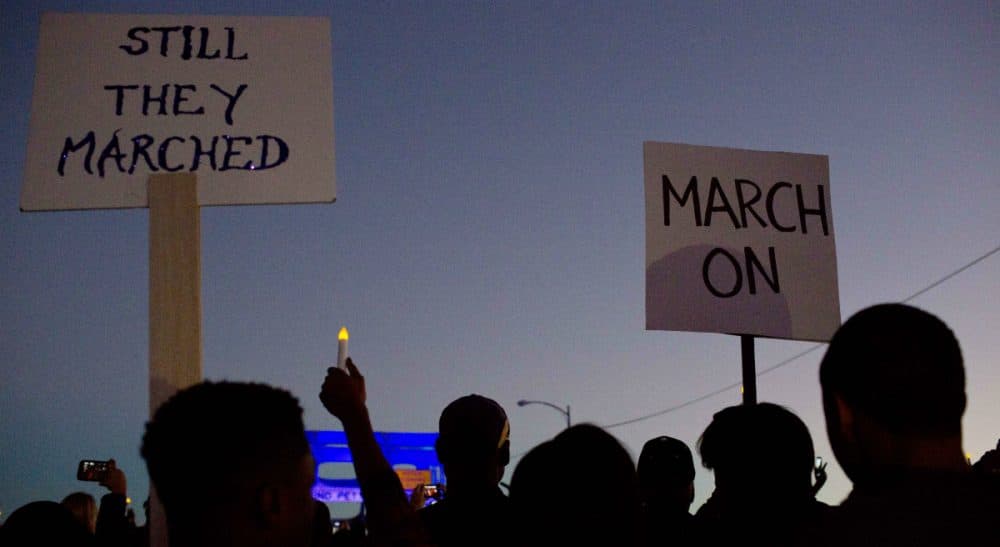Advertisement
In Response To Calls For Justice, Embrace MLK's 'Fierce Urgency Of Now'

On Monday, the city of Boston and the entire country will observe the only national holiday dedicated to civil rights by remembering the life of the Rev. Dr. Martin Luther King, Jr.
We do so against the backdrop of the 50th Anniversary of the famous civil rights marches in Selma, Alabama, where hundreds of people – black and white – put their lives on the line to march through the streets and over the Edmund Pettus Bridge to demand equality under the law.
These marches, portrayed in the Oscar-nominated movie, "Selma," by director Ava DuVernay, were key to creating the political climate necessary to pass the Voting Rights Act of 1965.
Civil disobedience has always been critical to bringing about constructive social change in America.
Today is our historic moment. Once again, ordinary people – black and white – are putting their bodies on the line to demand equal treatment under the law. In cities and town across our Commonwealth, and our nation, people are marching in the streets, even blocking highways, to protest a growing system of inequality that threatens the foundation of our democracy.
Civil disobedience has always been critical to bringing about constructive social change in America. The Boston Tea Party, the abolitionist movement, women’s suffrage, the rise of the labor movement, and, of course, the civil rights movement are just a few examples of times when nonviolent civil disobedience led to constructive policy change. Regardless of whether President Lyndon B. Johnson personally wanted to pass the Voting Rights Act or not, there’s no question that the Selma marches created the political conditions necessary to ensure its passage.
So, where does that put the recent public protest actions by Black Lives Matter and their allies in Boston and across the nation?
In response to protesters blocking traffic in and out of Boston last week, Mayor Marty Walsh reiterated the cry that has become popular among both city and state officials: what do the protesters want?
But, as the Mayor knows, a study commissioned by the Boston Police Department itself shows that the Boston Police Department has a history of treating Blacks and whites unequally.
Advertisement
Based on data collected between 2007-2010 – but still not publicly released by the Boston Police Department – a person’s black race significantly influenced the number of police encounters in Boston communities, even when controlling for crime. Race also influenced whether a person in Boston was subjected to repeat encounters with the police. Worse yet, race also significantly influenced whether that encounter escalated to a frisk or a full-blown search.
Ask yourself: how many times has a police officer patted you down or reached into your pockets? If the answer is zero, chances are you are white or privileged.
But for tens of thousands of people in Boston and throughout Massachusetts, the answer is that they have been stopped, questioned, and frisked by the police – at least in part because of their race. For too many, being stopped and frisked is a regular occurrence – on their way to school, to work, or to the store, sometimes dozens of times a year. No wonder they’re willing to put their bodies on the line in public protests. After all, if you’re going to get man-handled, it may as well be for a cause.
But anyone who says that the protesters haven’t made clear demands is not listening.
The ACLU, the Boston Police Accountability Coalition, and a range of other groups have publicly and repeatedly pressed the city to adopt three new policies: body-worn cameras, civilian-police encounter receipts, and the regular publication of data on policing.
Others have called for civilian oversight boards.
Nationally, protesters have called for similarly concrete action: the de-militarization of local law enforcement; publication of data relating to racially biased policing; repurposing of law enforcement funds to support community based alternatives to incarceration; and the adoption of DOJ best practices, to name just a few.
anyone who says that the protesters haven’t made clear demands is not listening.
How many of these policy reforms have been adopted so far in Massachusetts? Zero.
Conversations are great – let’s have lots of them. But conversations need to lead to actual policy change or else they’re just a public relations campaign. We need new laws and new policies that will affect real lives… lives that matter.
“In this unfolding conundrum of life and history, there 'is' such a thing as being too late. This is no time for apathy or complacency. This is a time for vigorous and positive action.”
Rev. King was a man of peace. But he also was a man of action.
It’s time for us to act on the protests in Boston and across America with concrete policy reforms to restore community faith and trust in those who pledge to protect and serve us all, equally. Embrace the fierce urgency of now.
This piece was co-authored by Carl Williams. Williams is a staff attorney with the ACLU of Massachusetts and worked previously for the Committee for Public Counsel Services’ Roxbury Defenders Unit.